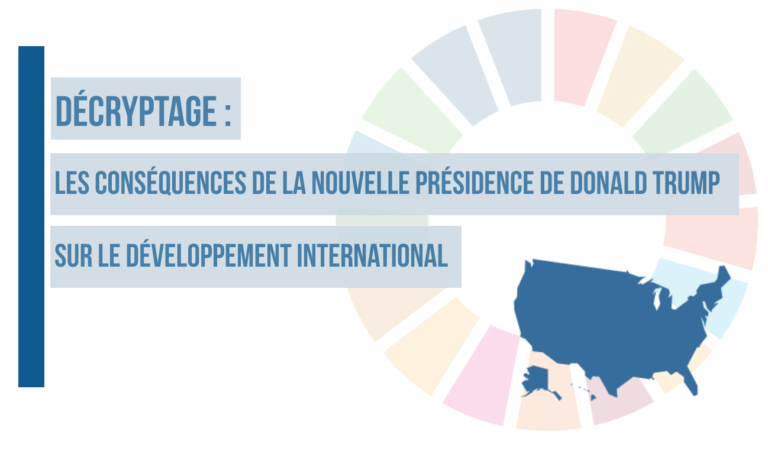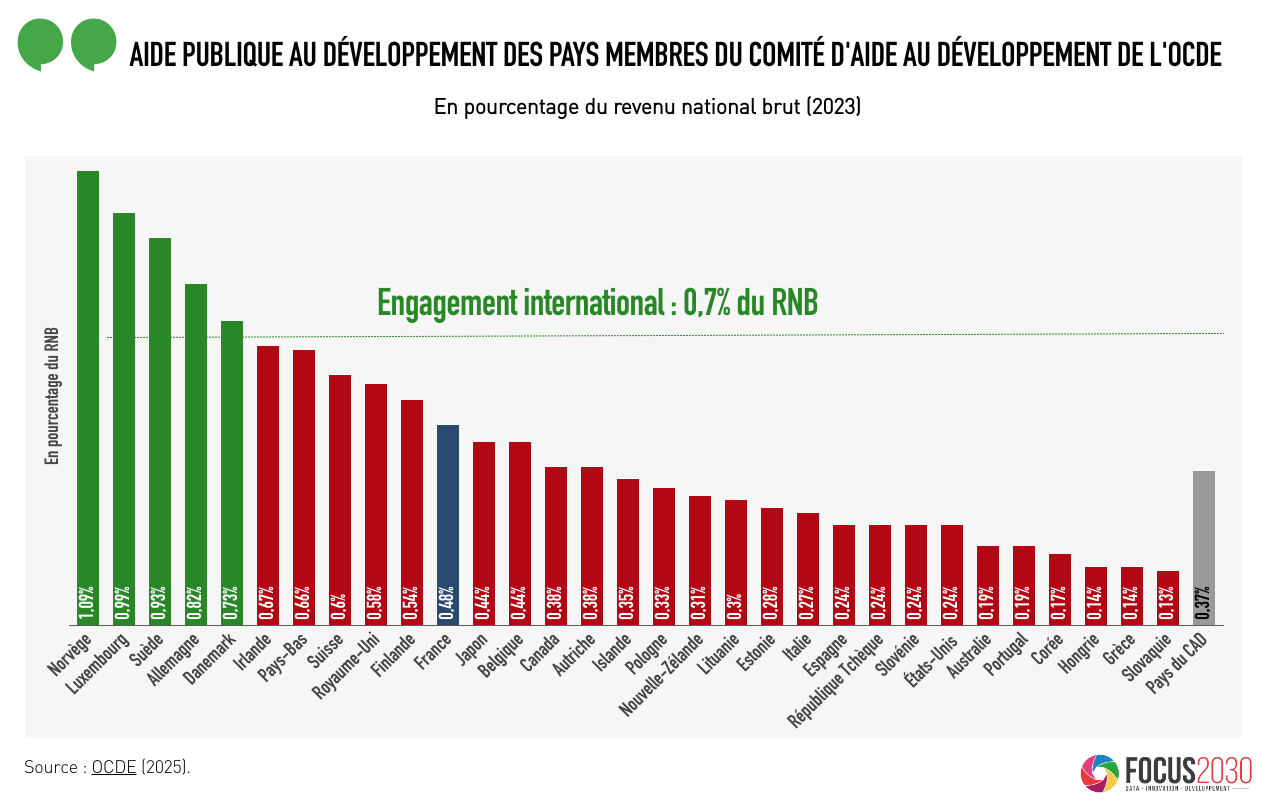What the French expect from the Summit for a New Global Financing Pact
Publié le 12/06/2023, modifié le 19/06/2023.
| In partnership with University College London (UCL) and the University of Birmingham, Focus 2030 is conducting an action-research program to analyze citizens’ opinions, attitudes, knowledge and feelings on issues related to international solidarity. This program covers four countries: France, Germany, the United Kingdom, and the United States.
This project called the “Development Engagement Lab” (DEL) provides data to development actors (NGOs, foundations, think tanks, ministries, public institutions, international organizations) to help them better understand citizens’ expectations and increase the effectiveness of their communication, mobilization and advocacy activities. The results presented below are based on a survey conducted by the YouGov institute between May 19 and 25, 2023 among a sample of 2,000 people representative of the adult population in France. Margin of error: ±2%. |
| Focus 2030 published a Special Edition to present the issues at stake at the Summit for a New Global Financing Pact, and the solutions it could bring. In this dossier, you’ll find facts and figures, infographics, experts’ interviews, citizen mobilization campaigns, and opinion survey results related to the Summit. |
The scale of today’s global challenges, including the fight against extreme poverty and climate change, requires to rethink the financing of international solidarity. While questioning current models for financing these efforts, as well as the possibility of innovative financing on a global scale, today’s challenge is to imagine new political and economic relationships between the richest countries, on the one hand, and countries facing these challenges with too few resources, on the other.
Ahead of the Summit for a new global financing pact (June 22-23, 2023 in Paris), we asked the French about a number of initiatives that could help meet these challenges. This is more a collection of opinions and points of view than a true measurement of knowledge about international issues, which are certainly identified by public opinion (poverty, climate change, the economic situation of poor countries), but whose solutions involve technical and political aspects that are relatively unknown. On the one hand, we questioned the French on the timeliness and impact of such a summit, which they had probably heard little or nothing about. Secondly, we asked them about the principle of certain development financing mechanisms.
In this series of questions, we observe that a higher level of education is invariably associated with stronger support for the initiatives questioned.
64% of French people surveyed believe that the summit is necessary
When asked about the need to organize an international summit in Paris to (attempt to) resolve the economic difficulties currently facing the poorest countries (notably as a result of the Covid-19 pandemic and the consequences of the war in Ukraine), a majority of French people support the principle of such an international meeting. Only a quarter of those questioned thought it unnecessary.
84% of French respondents believe that the financial difficulties of poor countries will have an impact on the French and global economies over the next three years
When asked about the medium-term impact of the economic difficulties currently facing the world’s poorest countries, the French show that they understand the reality of a globalized economy. In other words, 84% recognize that what affects one country affects the whole world. This perception is slightly more pronounced among 25 to 34 year-olds (88%), a difference of +9 percentage points compared to their elders aged 45 to 54. In the same proportions, 83% believe that the French economy will be affected by the difficulties experienced by the poorest countries over the next three years.
It’s hardly surprising, then, that the French support the organization of this international summit, since they perceive that the economic situation of France on the one hand, and of the whole world on the other, is at stake, due to the situation the poorest countries are facing.
In addition, 71% of French respondents (down 13 points) feel that their personal situation is also likely to be affected by the situation in poor countries. This perception is slightly more pronounced among men (73%) than among women (67%).
The French are rather divided as to the responsibility of the French government in organizing this type of international summit
Irrespective of their views on the relevance of such an international summit to resolving the economic difficulties currently facing poor countries, particularly since the Covid-19 pandemic and the war in Ukraine, the French were asked about France’s role or responsibility in organizing this international event.
36% recognize that organizing such a meeting is (also) France’s responsibility, while 34% feel the opposite. 21% are undecided on this question, which is a matter of international politics. In more detail, we note that slightly more 18-44 year-olds (40%) than their elders (33%) feel that it is France’s role to organize this summit.
The French are skeptical about the summit’s ability to (truly) change things
When asked whether this international summit is the right way to resolve the major economic difficulties currently facing poor countries, the responses of the French people show that they are particularly dubious.
Only a quarter (27%) believe that this summit will provide an opportunity to resolve the major economic difficulties facing the poorest countries today. Even more glaringly, 46% believe that it will not change things, while 21% are undecided.
On this question, women are slightly less pessimistic than men: 42% of them believe it will not solve anything, compared to 50% of men. Youth is also associated with a more positive view of the summit’s effectiveness. For example, 35% of 18-44 year-olds believe the summit will make a difference, compared to 26% of people over the age of 45.
61% of French people support the principle of a global tax to combat world poverty and climate change
When asked about the idea of introducing a global tax, the majority of French respondents supported the principle of such an initiative. Only 12% were against such a tax. If we combine support for this innovative form of financing with the percentage of those who don’t have any very precise ideas on the subject (21%), but who are not opposed, we can see that 83% of those questioned would be likely to support, or not oppose, this global tax, which would echo the globalization of the economy that the French seem to perceive in this series of questions.
The French support above all the taxation of companies whose profits are based on poor compliance with environmental standards, and of billionaires
Considering the impact that a number of economic players can have on global issues such as climate change and world poverty, 73% of French people surveyed believe that the profits generated by companies that fail to comply with environmental standards should be taxed.
In similar proportions, 71% of French people believe that billionaires should also be taxed. Next in line is the view that profits generated by the fossil fuel industry (64%) and companies in the financial sector (62%) should be subject to this tax. Finally, a majority of French respondents consider that this tax should apply to air transport (57%) and shipping (54%).
The French are most convinced by campaigns calling for the taxation of fossil fuel industry superprofits
Three campaign messages were presented to assess which generated the most support among French respondents. Taxing the fossil fuel industry (from a CARE France campaign) was a convincing message for 53% of respondents, followed by “redefining the rules of the game” (45%, ONE France campaign slogan) and “redistributing 2% of the world’s wealth to fight poverty and climate change” (41%).
This last message stems from the Songwe-Stern report (2022), which estimates that $2.4 trillion a year is needed to combat the consequences of climate change in developing countries, equivalent to 2% of global GDP. When French people were asked whether they were in favor of or opposed to “redistributing 2% of the world’s wealth to fight global poverty and climate change”, without mentioning that this was a campaign message, support was much stronger: 66% of respondents were strongly or somewhat in favor, against 19% strongly or somewhat opposed.
Regardless of age, income or level of education, the campaign message to tax the fossil fuel industries remains the most convincing. 57% of respondents aged 18 to 34 consider the message to redefine the rules of the game to be convincing in the fight against global inequality. This percentage drops to 45% among respondents over 35.
The French support a European tax on financial transactions
Asked about the possibility of the French government supporting the adoption of a Europe-wide tax on financial transactions, 81% would support (53%) or not oppose (28%) the idea. There is therefore no political opposition to the government supporting the adoption of such a tax at the European level. In fact only 12% are opposed.
The French are pessimistic about reducing carbon emissions by 2030, even though this seems more attainable than eradicating extreme poverty
When asked about the likelihood of achieving the goals adopted by the United Nations for reducing carbon emissions (Paris Agreement) or eradicating extreme poverty (Sustainable Development Goals) by 2030, the French are rather pessimistic.
However, more people believe that the goal of reducing carbon emissions will be achieved (22%) than that of eradicating extreme poverty (13%). Similarly, doubts about the likelihood of achieving these two objectives are less pronounced when it comes to reducing carbon emissions (46% believe that achieving this objective is unlikely), than when it comes to eradicating poverty (60% believe that achieving this objective is unlikely).
In both these respects, optimism is associated with youth. 23% of 18-34 year-olds believe it is likely that poverty will be eradicated by 2030, ten percentage points more than the responses obtained from French people over 35 (13%). Similarly, 35% of 18-34 year-olds believe it is likely that carbon emissions will be reduced by 2030, 17 percentage points more than French people over 35.
43% of French people believe that the IMF and the World Bank should support the fight against climate change
When French people are asked whether they believe the historical missions (supporting economic growth, global economic stability and fighting poverty) of international financial institutions (IFIs) such as the IMF and the World Bank should expand to include the fight against climate change, 43% feel that they should indeed expand, while 30% consider that these institutions should stick to their original mandate. It should be noted, however, that a quarter of respondents (27%) do not know how to answer this question about institutions that turn out to be little known by the general public.
The French want poor and emerging countries to gain more power within international financial institutions
French people were asked about the distribution of power between rich, emerging and poor countries within the International Financial Institutions (IFIs). Looking at the situation of poor countries (such as Haiti, Niger, Ethiopia, etc.), 16% believe that they should be given more power in the IFIs, even if this would reduce the power of rich countries like France, while 32% feel the opposite. On the other hand, 33% feel that poor and rich countries should have equal power in IFIs. Consequently, 49% (16% + 33%) of those questioned would like to see a rebalancing of power between poor and rich countries within IFIs.
With regard to emerging countries, 17% of those surveyed were in favor of increasing their power in the IFIs, even if this would reduce that of rich countries such as France, and 37% felt that emerging and rich countries should have equal power in the IFIs. Thus, 54% of French people surveyed express support for a rebalancing of power between emerging and wealthy countries in the IFIs, versus 30% who are not.
| These data come from our survey conducted by the YouGov Institute and piloted by the University College London and University of Birmingham research team as part of the Development Engagement Lab project. Information and methodology available here. |











